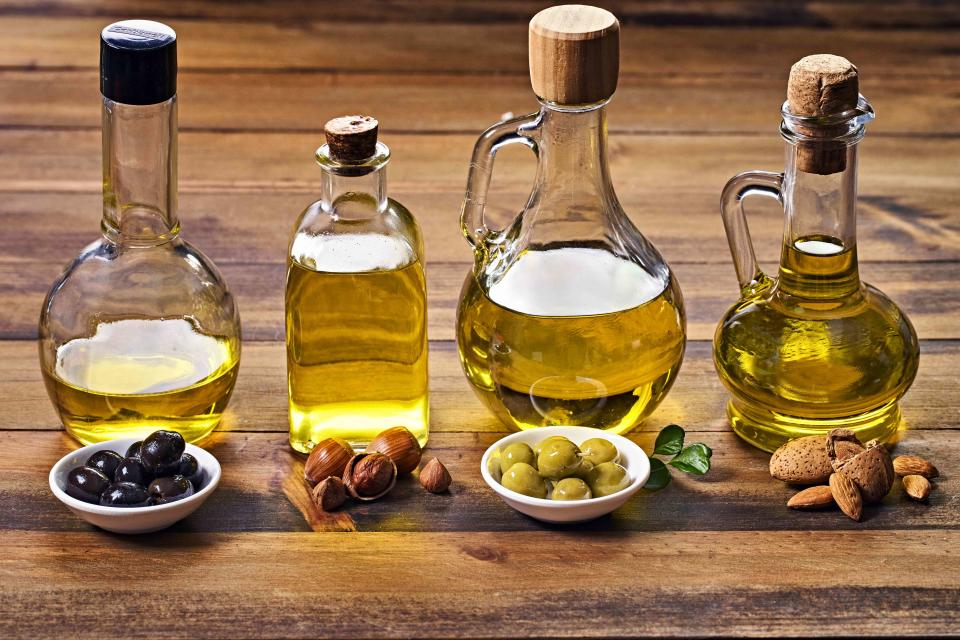What’s the Best Oil For Frying? Here Are Our 3 Favorites
These cooking oils yield the best fried food.

Apomares/Getty Images
Not sure which oil to fry with? Put down the pan, turn off the burner, and read on. Frying in the right oil is essential for your health, safety, cooking, and the overall flavor and texture of the food.
What separates frying oils from other oils is the smoke point. “A smoke point is the temperature that will cause an oil to begin to smoke, eventually burn, and potentially become combustible and carcinogenic,” says Cristina Topham, chef and owner of Spread Kitchen in Sonoma. “You want to use an oil with a high smoking point, as this will allow you to fry for a long enough time to cook your ingredient without the oil discoloration or burning.”
Related: Here's Why the Best Olive Oil Is So Expensive—and Why It's Worth It
You’ll also want to make sure your oil is fresh, and not rancid. Because yes, even oil can expire, especially if it’s not properly stored in a cool, dark place.
“Far too many people don’t check their oils,” Topham says. “Oil should smell fresh and clean. If it smells like crayons, it’s likely old.” Toss that old oil, and replace it with some of the best frying oils, including canola, peanut, grapeseed, and beyond.
The Best Oils For Frying
“Using the wrong oil can create off flavors and become unstable, which can be dangerous if left on high heat for too long,” says Topham. “It’s a waste of money to use certain expensive oils, like extra virgin olive oil or oils with any delicate flavors, such as truffle oil or pistachio or walnut oil, where the flavors would essentially be lost due to the heat exposure.”
Save the precious oils, like nut and seed oils, for finishing, and use some of the best oils for frying, specified below:
Canola Oil
Canola oil is a pantry staple and one of the best oils for frying pretty much anything in. It’s generally affordable and sold in bulk quantities, so you can pour a bunch into your frying vessel easily.
“I prefer non-GMO canola oil. which is what we use at our restaurant [for frying],” says Topham. “It’s got a high smoke point, neutral flavor, and is cost effective.”
Related: The 7 Healthiest Cooking Oils—and Which to Avoid
Whether you’re shallow or deep frying, canola oil works well. Try canola oil when cooking Crispy Chicken Cutlets, jelly doughnuts (Sufganiyot), or Fried Green Tomatoes.
Nutritionally, canola oil has kind of a bad rap, as it’s been tied to inflammation, but it’s much lower in saturated fat than most other cooking or frying oils.
Grapeseed Oil
Grapeseed oil is a favorite of many chefs and home cooks for its neutral flavor, and high smoke point of about 420 degrees Fahrenheit. That said, it’s typically much pricier than canola oil, but can be worthwhile for occasional home friers or small batches of something special, like Fried Herb Salsa.
“I also like grapeseed oil for cooking at home,” says Topham. “It’s cost prohibitive for the restaurant, but I like the light flavor. I can get grapeseed oil that is locally produced.”
Pressed from grape seeds (of which there are plenty in wine country), grapeseed oil is naturally high in vitamin E, and is considered a natural antioxidant, so frying in grapeseed oil may also offer some nutritional benefits.
Peanut Oil
Peanut oil is a popular choice for frying, thanks to its super high smoke point of 450 degrees Fahrenheit and the slightly nutty flavor it can impart when the oil heats up. Peanut oil is rarely used at restaurants due to allergies and cross contamination, but can be a great frying oil at home.
Related: How to Dispose of Cooking Oil Properly—and One Thing You Should Never Do
The burger chain, Five Guys, also famously fries their potatoes in 100 percent refined peanut oil, which doesn’t foam when the sliced tubers hit the hot oil, a nice tip for those making fries at home. Peanut oil also has high levels of vitamin E, plus monounsaturated and polyunsaturated fats, which means it’s potentially heart healthy in reasonable doses.
For more Real Simple news, make sure to sign up for our newsletter!
Read the original article on Real Simple.

